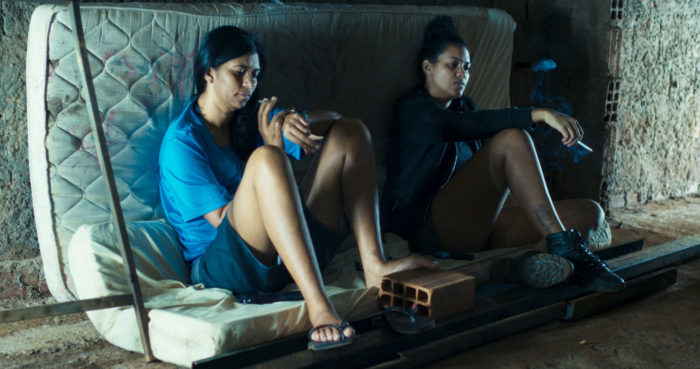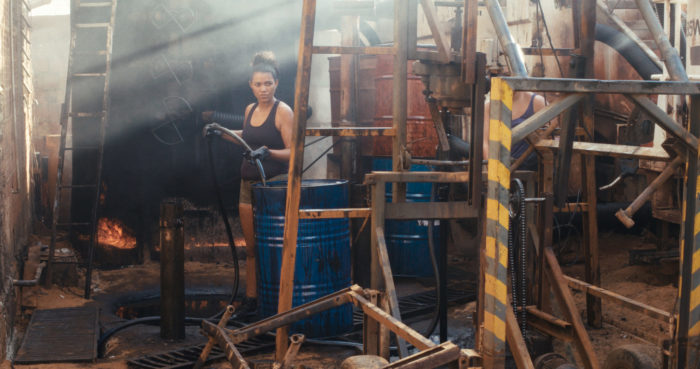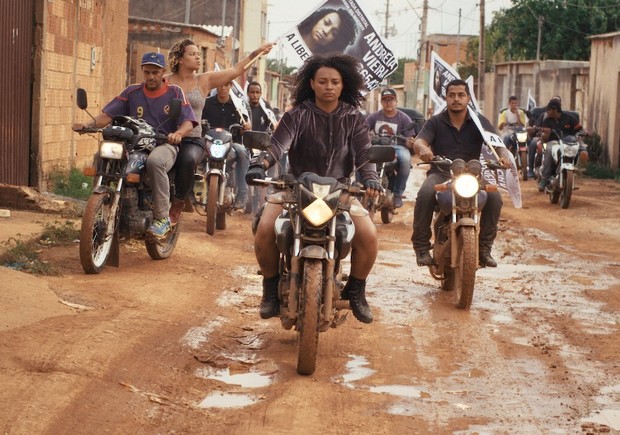Adirley Queirós Andrade’s latest feature film is a feral, genre-bending, award-winning story of women on the periphery. This review was originally published by our partners at Sounds & Colours. Read the original here.
The opening scene in Adirley Queirós Andrade’s latest genre mash-up Dry Ground Burning (Mato seco em chamas, 2022) depicts the intensity of radical heat: a quenchless fire and the distant barking of dogs blends with the dark night in the favela of Sol Nascente. We are in Ceilândia, the most populated satellite city of Brazil’s Federal District, created by the government in the 1970s to keep people from moving into the country’s capital, Brasília.
‘In a favela on the edge of Brasília, a group of women hijack a pipeline to sell oil to their community. A mixture of observational documentary, gangster film and science fiction, in which amateur actors play fictionalized versions of themselves’ is the description given by the film’s director, who has himself lived in Ceilândia for over 40 years. His connection to the place is strongly mirrored in his filmography and he is an advocate for social justice, especially in stranded and marginalized communities of Brazil that struggle to survive on the periphery.

Shot entirely in the Sol Nascente favela, the film is a dystopian reflection of Brazil’s present society, portraying the contemporary political turmoil in Brazil under President Bolsonaro. The problematization of social issues echoes the voice and form of Glauber Rocha’s Cinema Novo, with the narrative and camera-work creating a futuristic dystopian sci-fi. The plot is feral and aggressive, criticizing the oil policy and the unfulfilled promises made by Brazil’s former president Dilma Rouseff to dedicate ‘pre-salt’ royalties towards health and education.
Behind the walls of Colmeia, the women’s prison of Brasília, Léa tells the story of the Gasolineiras de Kebradas. Led by her half-sister Chitara, the female gang run a business of stealing oil from underground pipes from a lot in Sol Nascente. The oil is pumped by a makeshift system and a distribution deal is made with the local ‘motoboys’. The horde of male bikers also acts as guardians of the favela, protecting the community from the patrolling authoritarian armoured police. Half-way through the film, to get their community back from tyrannical patriarchy and globalization, the Gasolineiras group create a political party and run a political campaign in protest of Bolsonaro.
The film mixes fiction and documentary in a methodology already established in Queirós’ productions. Inspired by the works of Jean Rouch, he proposes an innovative perspective on film production. Queiros’ approach is to propose a fictionalized project and then film it as a documentary. Real stories are incorporated into a script that is never closed, with non-actors sharing their real names with the characters in a blend between facts and fabricated storytelling which Adirley dubbs ‘ethnography of fiction’.
Co-directed by Portuguese filmmaker Joana Pimenta, who previously collaborated with Adirley on Once There Was Brasilia, the film focuses on the overlooked female ex-convicts from the Colmeia prison, fictionalizing their life stories. In Dry Ground Burning, women are self-sufficient, independent, and far from co-dependency with men. In this panorama, men in fact serve and follow the orders of a group legendary female figures, who fight for the survival and resistance of their community.

The film had its world premiere at the 2022 Berlin Film Festival. It won the International Competition Grand Prize at the Film Festival du Réel in France 2022, and both the Grand Prize City of Lisbon and Best Portuguese Feature Film at the IndieLisboa International Independent Film Festival 2022.
Dry Ground Burning opened the seventh Frames of Representation Festival at the ICA in May this year and was released in UK cinemas 2 September, 2022.


